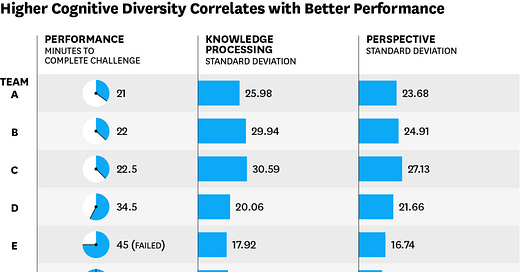Inspiring Fear
Zoë Heller | Organizations and Their Leaders | Factoids | The Power of Cognitive Diversity | The Blur of Remote Work
Quote of the Moment
All technological innovations inspire fear.
| Zoë Heller, How Everyone Got So Lonely
I am writing this on Cyber Monday, when everyone is loading up on tech toys. I am resisting the urge to buy anything, not as a political statement, but just as obstinacy (and fear of AI in everything).
Organizations and Their Leaders
Gary Hamel is one of the smartest observers of organizational illogic. He offered this over the weekend:
For two reasons, leaders are often reluctant to be honest about how f***ed up their orgs actually are. First, it can seem like a self-indictment (it must be the leader's fault); and second, it's another stick for the leader's back (who, if not the leader, is going to fix it?). The only way out of this conundrum is for leaders to (1) recognize that most orgs suffers from the same pathologies (no single leader is at fault); and (2) admit the problem is too big to be tackled top-down and must be crowd-sourced to the entire org. Honesty + humility are key.
This is one of the reasons CEOs are getting sacked at a higher rate today than in the past: it’s often easier for an incoming CEO to make changes because they don’t have to own the current f***ed state of the organization: that was the other guy’s fault.
This syndrome is related to The Power of Cognitive Diversity section, below.
sponsor: hal9
Chat with your enterprise databases using secure generative AI and empower business users in your team to do their own data analyses in seconds.
Factoids
In the U.S., living with parents is now the most common domestic circumstance for people between the ages of eighteen and thirty-four. | Zoë Heller
A big shift since the pandemic, I bet. But Heller suggests that a decline in libido (less sex) among young people is part of the issue, not just the economics of homeowning/renting.
…
A study published in Environmental Science and Technology, a journal, suggests that a five-day heatwave in Phoenix, with a blackout, could kill more than 13,000 people and send more than half of the city’s residents to hospital. | Aryn Braun
Note: in the US there are no federal heat protections for workers.
…
After adjusting for inflation, there have been more billion-dollar disasters so far in 2023 than any year since America’s National Oceanic and Atmospheric Administration began keeping records. As climate change continues, the uninsurable parts of America will only grow. | The Economist
Large insurance companies are departing the most disaster-prone areas, like California, Florida, and Louisiana. You can’t set insurance prices on the completely indeterminate (Knightian Uncertainty). This is going to have a massive impact.
…
Uber reached a milestone recently, posting its first-ever operating profit of $326 million. Uber has burned through $31.5 billion in operating losses since it started reporting finances in 2014. | via Dense Discovery
That profit is just a hair over 1% of those losses. Why does Uber have a 113.84 billion market cap, exactly?
…
Human beings have put about 1.6 trillion tons of carbon in the atmosphere since the Industrial Revolution — more than the weight of every living thing on Earth combined. | Kate Marvel
Yikes.
Black Friday/Cyber Monday deal!
The Power of Cognitive Diversity
In Teams Solve Problems Faster When They’re More Cognitively Diverse, Alison Reynolds and David Lewis report on recent research. Cognitive diversity is critical for fast problem-solving (and problem-solving in general). It's harder to see than gender, racial, or age diversity. There are strong cultural barriers to cognitive diversity since people hire to roles (which constrains who's picked) and people select people who think like them. Better to hire for cognitive diversity. 'When you face a new, uncertain, complex situation, and everyone agrees on what to do, find someone who disagrees and cherish them’.
The Blur of Remote Work
In What We Do and Don't Know About the Effects of Remote Work, Emma Goldberg pokes her nose into the state of remote work circa late 2023. The result?
Apparently, we don't really understand what is going on with remote/hybrid work. Various studies show enormous spreads in productivity. There isn't a real calculus for the slippery slopes of postnormal work. It does seem that a new status quo is emerging for knowledge work: 'offices are at about half their prepandemic occupancy levels and about a quarter of American workdays are done from home.'
Goldberg talks to a lot of opinionated people, many with a vested interest in having less remote work. And while she never explicitly says ‘only time will tell’, that is the drift.
She devotes a section to working women, which deserves its own article.
But there is no real bottom line to this piece, and she could have undertaken to gather a broader range of research findings.
Keep reading with a 7-day free trial
Subscribe to Work Futures to keep reading this post and get 7 days of free access to the full post archives.




